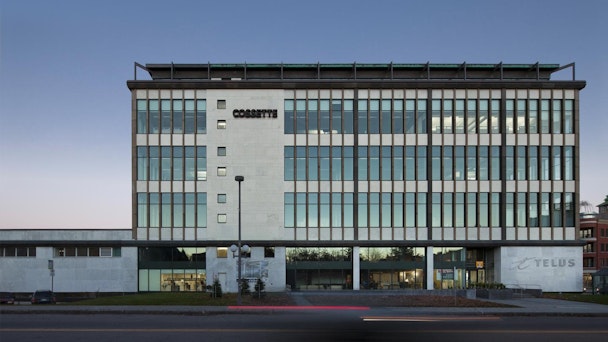Canadian Invasion: can Plus Company’s push south weather economic knocks?
Canada’s top agencies have been making big moves within the United States of late. In this series, The Drum takes a look at the key Canadian players and their ambitions for the US and the world.

Plus Company is the parent firm of Canadian agency network Cossette / Cossette
Plus Company has had a few different faces in its history. First known as Cossette, then as publicly-traded Vision7, then Chinese-owned BlueFocus International, it’s now making waves as Plus Company, a ”new model holding company” in the words of its chief executive officer Brett Marchand.
After BlueFocus’s majority stake was bought out by private equity firm CVC and Caisse de dépôt et placement du Québec (CDPQ), the company is determined to expand south of the border. It recently acquired San Francisco agency Mekanism to that end, and added Singaporean influencer shop Kobe to its roster.
Marchand claims that Plus embodies ”a new model holding company.” In plain English, that means it occupies a middle ground between the merged single P&L approach adopted by Accenture Song and the classic sprawl of the traditional ad giants.
While the latter used to ”make sense” to big clients (Marchand previously worked for Campbell’s Soup), internal competition between agencies for investment and work ”is crazy.” And while he says he appreciates the logic behind the ”one place, one brand, one culture one way of doing things” approach, ”we don’t believe in that either.”
”We have single swim lanes, single P&Ls, we give leadership to one person around that area. We do have multiple brands but that’s because not every agency is right for every client.
”We think that there’s a middle ground for agencies keeping their name and their culture. That’s not just good for attracting the right agencies, it’s important for doing better work,” he argues.
Taking a laissez-faire approach to agency management makes Plus a more attractive partner to agency owners considering selling up, he suggests. ”We believe in independence, right? So even if we bought an agency in the US or in the UK or in somewhere else in Europe, we really want the brands to stand up and keep their culture and their name.”
Middle ground
That middle way is demonstrated best in how Plus Company groups its agency brands. The company’s services are arranged into four pillars specialized for different client needs. The first is an ”integrated social and influencer offering,” including agencies such as The Narrative Group, Socialized and We Are Social.
The second is ”full-funnel creative,” the company’s term for blending e-commerce, design and creative expertise into the same pot as its flagship agency group Cossette. ”It’s the market leader by a long shot in Canada – it’s got super low customer turnover. We’re trying to replicate that elsewhere.”
PR is ”growing like crazy,” alongside pure digital transformation from Plus Company’s other primary service areas. When the pillars break down over geographic territories, it means the company maintains seven P&L lines, according to Marchand.
”That’s one of our key tenets ... we don’t like multiple P&Ls and competitors. If you’re in the business of serving clients and social, you should all be working on the same team to do that, even if we have multiple brands.”
Through its agency brands, Plus holds the business for several major global brands, including McDonald’s, OkCupid, Netflix and Peloton. It also has several in the tourism and air travel sector (”which was obviously hurt during the pandemic but has come roaring back”) and the telco business. ”We’re a brand-first group,” Marchand says.
Recruitment challenges
Plus Company’s US expansion comes at a dicey moment for the American economy. Inflation rose to 9.1% in June, a fact that will affect client confidence, staff and the way it approaches acquisitions. But the same conditions are hitting its competitors, Marchand notes – and a retreat by rivals may open up opportunities for Plus.
”It’s a good time to be opportunistic. With a downturn and what’s going on with the stock market, fewer people are acquiring. It makes it less competitive for us. I think we’re a very good choice for agencies regardless, but at the end of the day, what’s the old saying? Money talks, bullshit walks. If prices are down, it’s good for us.”
Plus Company employs around 3,000 staff across the globe. But its turnover has been uncomfortably high, Marchand says.
”Over the last 18 months, we’ve had close to 60% of our headcount as new employees,” he says. ”Some of that is growth, because we grew 23%. But a big part of that is we were in the low 30s on turnover percentage, and when you put the two together that’s a massive stress on the organization.”
The business currently has 200 open positions. It cut ”almost nobody” during the pandemic. However, Plus lost a crew because of rivals poaching its staff, Marchand argues. ”We were particularly hurt because agencies want to hire people who are working, not people who were laid off. It’s the thing that keeps me up at night. Our employee engagement is the highest it’s ever been. But [wage] inflation is dragging people out to new jobs.”
However, Plus hasn’t only had to play gamekeeper throughout the pandemic – and it’s done some poaching of its own: Droga5’s Benita Meswania arrived as chief people officer in March and Sapient’s Nathan Oliver was hired as chief growth officer last November. A new chief technology officer is incoming, and Brian Whipple joined the board in June following his exit from Accenture Interactive.
The best way to maintain growth during a likely downturn, Marchand says, is to become better at retaining staff. ”The number one thing is to keep our talent, keep growing them and do everything else we can to continue to be successful financially without cutting people.”

